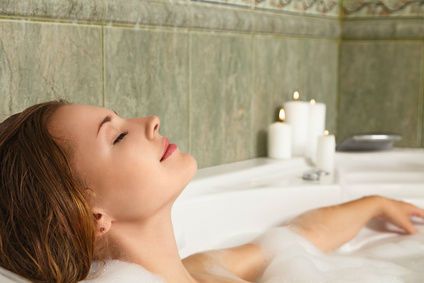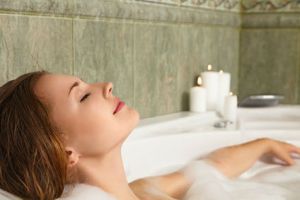
“There must be quite a few things that a hot bath won’t cure, but I don’t know many of them.”
― Sylvia Plath
Since time immemorial, bathing in water has been equated with good mental and physical health. In the third century, bathing establishments were all the rage.
The ancient Greeks and Romans erected expensive and well-appointed bathhouses where they could not only conduct business, but also gather with friends, eat and drink. To them, bathing was social as well as therapeutic.
Some public bath emporiums were so elaborate that they even contained art galleries, meditation and prayer rooms, and lecture halls. The average public bathhouse could hold as many as 6,000 bathers at one time. The wealthy would bring along servants who would run errands and tend to their every need while they were in the bath.
Social festivities and physical fitness training were also common, and many a weary soldier found respite and healing in bath waters after a long stint in battle. These baths also employed some of the best healers.
To the Romans, bathing was for health, while the Greeks believed that full immersion into the water was only appropriate for women on an ‘anytime’ basis. For ancient Greek men, bathing was something done to cleanse one’s self and relax after a day at work, or before taking part in battle, conducting business or participating in a philosophical discussion.
Roman bathers might have been attended by as many as seven healers at one time, who would address different areas of the body during the bath. Some healers applied herbs, others oils, some gems etc. In fact, the services of these healers were often sought out before those of local physicians.
Bathhouses were not confined to Europe and the Mediterranean, and many other cultures, including the ancient Turks and Japanese, developed hot baths that were highly ornate and expensive with gold, silver and brass fixtures and artistic carpets and tapestries.
Spread of disease
Public bathhouses were only trendy for a short period of time in history, as plagues, epidemics and diseases spread quickly via water. Because early viaducts carrying the water were made of lead, they were also highly toxic.
Some people even became sterile or impotent because of the poisoning. Many stopped going to bathhouses, and soon they were closed altogether once the connection was made between them and the spread of disease.
Dirt was good but water was better
Bathing in Europe became less popular in the late 16th century, and at one point it was believed that dirt was protection from germs. When this belief caught on, the body was covered by layers of cosmetics, hair by wigs, and perfumes were used to hide body odor.
In the early 1800’s, when so many people died from the plagues in England, water regained its acceptance and was found to be not the cause of illness but rather part of the cure. The English put a great deal of time and money into the development of bathroom technology.
Once water was accessible, many healing therapies were used to treat and prevent diseases such as typhoid. Bathing was back in, and going to baths loaded with Epsom salts and minerals became a well respected and therapeutic approach to wellness. Spas sprouted up all over Europe as hydrotherapy, and thermal healing gained steam; it was even taught in medical schools.
Through the ages, water has been used for hygiene, socialization and healing. Today, spas, saunas, Jacuzzis, hot spring baths, sulphur baths, mineral baths and even water births are well accepted.
However, you don’t have to save up for a trip to a famous spa or visit a hot spring in order to reap all of the amazing benefits bathing has to offer. Making the time to enjoy a warm bath at home could be one of the best things you do for yourself – even if it is only once a week! Here are five reasons to start enjoying a bath today:
Improve sleep
If you are like millions of other Americans who struggle to get enough shut-eye, a warm bath may be all you need. Bathing before bedtime raises body temperature, which, once you are out of the bath, begins to cool. This signals your body that it is time to rest, and you will gradually start to feel sleepy.
For an even more relaxing bath, add a few drops of lavender essential oil diluted in a carrier oil, or organic bath bubbles. Lavender has been proven to reduce the stress hormone cortisol, so add a few drops to the water, rest your head on a bath pillow, close your eyes and dim the lights. Just don’t forget to go to bed!
Reduce pain
Hydrotherapy is a highly successful treatment modality used to reduce pain. A warm, not overly hot, bath is a great way to relax muscles and promote healing. It appears as though adding some Dead Sea salt to warm bathwater can be extremely beneficial to arthritis sufferers in particular. Research out of Manchester University found that the cells in persons who suffer from arthritis expand, but that salt water reduces these cells by dehydrating them.
Other research has found that Dead Sea bath treatments help combat symptoms of osteoarthritis, and recent reports show that it is also an effective option for people with joint conditions. You can also add Epsom salts to your bath, which will reduce inflammation and help reduce muscle soreness.
If you suffer from back pain, bring a tennis ball with you into the bath and place it between the sore spots and the wall or bottom of the tub. Gently roll back and forth to break down tension spots.
Note: If you happen to have a jetted tub, this will have additional therapeutic benefits for sore muscles and achy joints.
Soothe dry skin
Oatmeal not only makes a fabulous breakfast cereal, it is also a fabulous skin softener. Oatmeal is a skin protectant that provides a buffer against irritants, and reduces the itchiness and pain associated with common skin conditions.
Known in folk medicine as a great way to ease the itch of poison ivy, an oatmeal bath can also help soften and moisturize dry skin and reduce the pain of sunburn.
Because it contains anti-inflammatory properties, oatmeal soothes the swelling that results from skin conditions such as psoriasis or eczema. Oatmeal baths protect the skin, locking in moisture, balancing pH and providing a barrier against external irritants.
Natural compounds found in oatmeal known as saponins make oatmeal and effective cleanser by absorbing dirt, oil and odor. You can even add a little extra virgin olive oil to the bath to really boost its moisturizing impact.
To take a soothing oatmeal bath, use colloidal oatmeal that will not sink to the bottom of the tub but remain suspended in the bathwater. Run warm water into your tub and add the oatmeal as the water runs.
Ensure that the oatmeal is well mixed with the water, and soak for about 15 minutes in the bath. Pat your skin dry with a towel – do not rub, it causes irritation. To soothe itchy or irritated skin, take up to three oatmeal baths daily.
Boost brainpower
Research indicates that soaking in a warm bath with clary sage oil can not only promote overall relaxation but also boost brainpower. The therapeutic use of sage has been known for centuries, and has been used traditionally as a massage oil or as a tea. Other benefits of sage include mood improvement, muscle relaxation, blood pressure reduction, anxiety relief and digestive aid.
To sharpen your cognitive functioning, place 7 drops of the oil in a carrier oil such as sweet almond oil, and put the mixture in your warm bath. Soak in the bath for twenty minutes or so to sharpen your mental state. This is particularly effective if you are experiencing writer’s block, are in a creative slump or have to make a big decision and need clear thinking.
Decrease stress
Probably one of the best known side effects of a warm bath is the way it reduces overall tension in the body and mind. One way to really reduce stress is to take what is known as a meditation bath. In a meditation bath, you can add calming essential oils such as lavender, sandalwood, German chamomile or sweet marjoram.
 Be sure to dilute the essential oil in a little organic bubble bath, or a carrier oil if you have sensitive skin. You can also dim the lights, burn a calming candle or some incense for added relaxation. Once you are in the bath, relax and allow your breathing to become slow and deep.
Be sure to dilute the essential oil in a little organic bubble bath, or a carrier oil if you have sensitive skin. You can also dim the lights, burn a calming candle or some incense for added relaxation. Once you are in the bath, relax and allow your breathing to become slow and deep.
Focus on the warmth of the water, the aroma of the oil and the sensation of buoyancy that the water provides. Stay focused in the present, pushing any thoughts of the past or future aside. Continue this for about 10 -15 minutes as you enjoy the overall relaxation of the bath and meditation session.
Bathing tips
- Use only non-toxic cleaners on your bath
- Use a filter on your tub so that your water does not contain harmful chemicals
- Do not bathe in extremely hot temperatures – always test the water before getting in
- Always blot your skin after a bath – do not rub
- For added moisture – apply a thin layer of extra virgin organic coconut oil to your skin after your bath
- Use an inflatable pillow to rest your neck while in the bath
- Apply an organic facial mask while you soak
- Keep a beverage handy while you bathe – a glass of lemon water or cup of tea is a nice addition to a relaxing bath
- Never reuse or share bathwater
- Always test your skin for sensitivity before adding essential oils to your bath
Happy Bathing!
-The Alternative Daily

